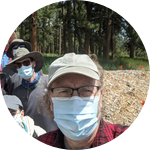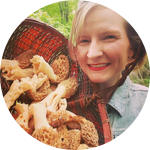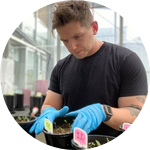Mycological Innovations
Categories

Fungi are the basis on which many fundamental living networks rely. Research and experimentation in the field of mycology can help our society to discover new approaches to heal ourselves and our home planet. Science Lead: Antoni Gandia
The Projects
Browse the participating projects
Carbon sequestration potential of fungally produced composts
Our previous study on the decay of forest waste products found that the compost produced by wild fungi holds...
Participatory research to explore fungal biodiversity and its importance to bees
Of the millions of fungal species, less than 150,000 are known. At our community lab, Hackuarium, we have...
Exploring material properties and fabrication processes of a mycelium based surfboard
The modern surfboard comprises layers of unrecyclable plastic which often break and pollute our oceans...
Is mycelium clay a suitable replacement for large scale gypsum polymer structures?
Myco-composites are sustainable and renewable alternatives to toxic petroleum plastics but require monitored...
Increasing the bioavailability of carbohydrates through the interface of mycology and fermentation
Due to increasing reliance on grain as a source of carbohydrates, shortages can occur if supply is interrupted...
Can we hear how mycelia communicate?
Mycelial networks are the root like structures of fruiting body mushrooms. Spontaneous electrical low-frequency...
How can white-rot fungi transform agro-industrial waste ?
France and Europe's first agricultural region, Nouvelle Aquitaine, generates an excessive flux of lignocellulosic...
Searching for threatened waxcap fungi
‘Waxcap’ fungi of the tribe Hygrocybeae are a good indicator of environmental health due to their specific...
How does agriculture in Australia impact the diversity of beneficial soil fungi?
Plants co-evolved with a group of soil fungi called arbuscular mycorrhizal fungi that support plant nutrient...
How carbon sequestration is modulated by Mycorrhizal and soil bacteria symbionts in Abies trees?
Mycorrhizal communities are a fundamental mutualistic interaction between soil fungi and trees. However...
Improving the qualitative properties of mycelium skins through fungal-bacterial biocomposites
Farming animals for leather is a water, chemical, and energy-intensive process. Fungal "leather" could...
Can we produce composite leather by biodegrading textile waste, using mycelium?
Can textile waste be repurposed and recycled as a raw material for the growth of mycelium leathers? Textile...
Genetic engineering of fungi for next generation sustainable tools
Anthropogenic influence on the Earth has had a negative effect. We need to create a sustainable way of living...
More About This Challenge
The sciency details
Challenge Aims
The Fungal Kingdom is known to host some of the oldest friends and foes of humanity. When properly used in many modern and traditional processes, fungi are fundamental in the production of bread, beer, cheese, sauces, pigments, antibiotics, industrial enzymes, vitamins, and many other essentials across human civilizations. Speaking about their significant importance, one should consider that more than 95% of the known plants rely on symbiotic relationships with fungi in order to thrive, which directly conditions agricultural yields worldwide. Not only industries, plants and planetary ecosystems depend on healthy fungal networks, fungi live as well in our own guts, skin and hair, contributing to our health and moods.
The most conservative estimations sum up a total of approx. 3.8 millions existing species of fungi on Earth, from which few more than 120.000 have been identified, which leaves scientists with a gigantic pool of new and unknown interactions, bio-tools and compounds waiting to be discovered.
The Mycological Innovations fund aims to provide basic financial support to enable citizen-scientists, mycologists and fungal innovators to explore fundamental questions and novel ideas related to fungi, including ecological roles, physiological studies, and potential applications in a wide range of fields such as ecosystem restoration, materials science, biochemistry, biopesticides, bioelectronics, and alternative food sources, to mention a few possibilities.
In order to support the effort, the Footprint Coalition is contributing $50,000 to back the projects here on Experiment that relate to research on sustainable Mycological Innovations. This fund will help back up each project up to 50% of the estimated cost (up to $5,000/project). As in previous editions, the funds will be distributed on a first-come, first-serve basis. The sooner you fill out a project application the better (use the "start a project" link below). In addition to the funding, we hope to stay engaged with the projects as mentors and supporters, helping in any way we can to make your mycological experiments a success.
______________________________________________
Part of the Footprint Coalition Science Engine














 Challenge Grants
Challenge Grants